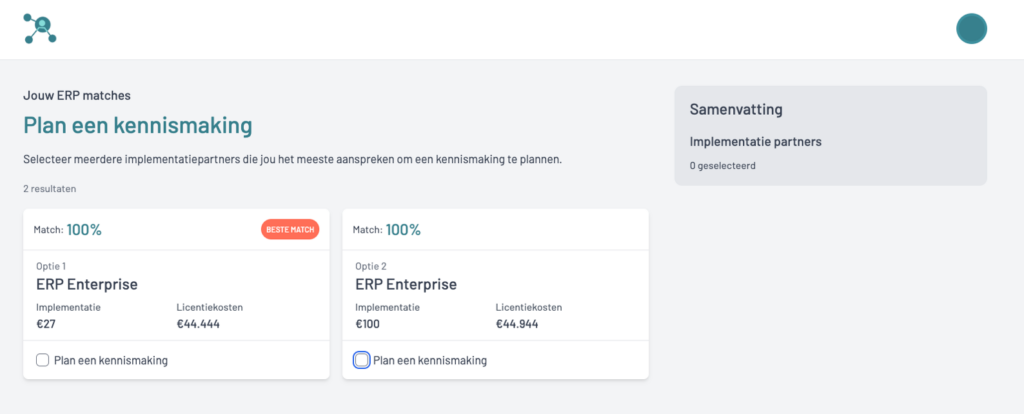
Are you curious about what ERP systems are out there? And do you want to know which system suits your organization? On this page we answer all these questions.
Below we show you 11 examples of ERP systems.
Click here to go to the ERP system examples immediately.
Whether a specific ERP example suits your organization cannot be said directly; it depends on many factors.
If you want real advice tailored to your company and situation, use our ERP systems comparison tool. Within 5 minutes and without obligation you will get a list with matching ERP's.
11 examples of ERP systems in a row:
The above list of ERP systems was compiled by myself. The list above is sorted in alphabetical order. Also the mentioned systems are a nice mix with well-known players and more niche-suppliers.

But why should you listen to our advice?
Currently, more than 60 ERP vendors are on our platform. We also enjoy close ties with many of them, providing us with unique insights into their systems.
Below you will discover more about the strengths and less amazing points of each ERP system. Curious about the main advantages and disadvantages of ERP systems? Check it via de link in the previous sentence.
These are the six most important types of ERP systems:
| Industry-focused VS modular |
| Type 1. Industry-specific ERP software (wholesalers, production, etc) |
| Type 2. Modular ERP systems (can be used by every organisation) |
| Cloud VS on-premise |
| Type 3. ERP systems running in the cloud |
| Type 4. ERP systems running on your in-house servers (on-premise) |
| Size of the business |
| Type 5. ERP systems for big business/enterprises |
| Type 6. ERP for small-and-medium-sized businesses |
Above you already saw the list of the 11 systems. Now let's look at the strengths and lesser strengths of each system.
For each ERP example, you can also see which type of company the system fits or does not fit. So you can see at a glance if the specific ERP suits your organization.
Below is the first ERP system from this list:
ActoBusiness is an ERP software solution aimed at installation companies. Acto's ERP system offers specific functions such as calculations, quotations, project and service management.
These are the strengths and lesser strengths of ActoBusiness' ERP:
| Strengths of ActoBusiness | Lesser strengths of ActoBusiness |
| Specifically aimed at installation companies. | Not suitable for companies outside the installation industry. |
| Modular and adaptable to your specific needs. | Less extensive functions than larger systems. |
| The system is easy to use. | Integrations with larger and/or non-scalable may present challenges. |
| Provides in-depth insights into business operations. |
To whom does this system fit perfectly?
Acto's ERP system is made specifically for installation companies.
Want to see more ERP systems suitable for installers? We made a dedicated page for you with the three best ERPs for installers.

Want to discover if this vendor is your perfect match? Fill in our tool and join hundreds of satisfied users:
Want more information about our ERP selection tool? Discover it on our page about how we compare ERPs per sector and company size via our free software.
ANB5 Business suite is a comprehensive software solution for the retail and wholesale industries (discover more about ERP-software for wholesalers in our extensive blog).
This system covers essential business processes such as CRM, item management, inventory, order processing and accounting.
ANB5's ERP includes these five main components: CRM, administration, purchasing, WMS system and EDI links.
Read more about the strengths and lesser strengths of this ERP system below:
| Strengths of ANB5 | Lesser strengths of ANB5 |
| Implementation within only 2 days | Not suitable for companies outside retail, wholesale or specalistic companies in the computer industry |
| Admitted customers receive direct and comprehensive support | Only a limited number of customers are accepted. |
| Specifically aimed at companies looking for item management, accounting and order processing. | The company behind this ERP is much smaller than a Microsoft or Oracle (can obviously be a positive!) |
| Access to API links and the ability to automate things through Marketing Automation. |
To whom does this ERP-system fit perfectly?
The ANB5 system is specifically for companies in the retail, wholesale and specialized computer industry.
Are you looking for a personal and close collaboration? Then ANB5's ERP (and the organization behind it) is a good match. In fact, the company behind this system is looking for a select group of customers. This allows ANB5 to fully dedicate itself to you as a customer.
Claever offers an Enterprise Resource Planning System specifically for three niches. Namely, fish processing, meat processing, and refrigerated and frozen warehouses.
This makes the ERP of Claever very focused on specific go-to markets. Fun fact: Cleaver is also based in Norway!
| Strengths Claever | Lesser strengths of Claever |
| Focused on specific markets | A narrow focus on only three markets |
| Well-versed in their clients' | |
| Small organization with short lines of communication | |
| Suitable for growing organizations |
To whom does this focused ERP fit perfectly?
This ERP system is highly specialized, catering exclusively to fish processors, meat processors, and refrigerated and frozen warehouses.
While this focus can be viewed as an advantage, it may also be perceived as a limitation
Exact offers three different types of systems, namely systems for: wholesale, project management and manufacturing companies.
| Strengths Exact | Lesser strengths of Exact |
| Exact offers international customer support | You might need to purchase multiple modules |
| Everyone involved has access to the same data, ensuring uniformity and accuracy | Steep learning curve |
| Different activities are housed in one system, this ensures fewer errors in your process. | Customer service is not as good as the provided service by many other providers |
| Easy to use |
To whom does this ERP fit perfectly?
Exact offers specific solutions for wholesalers, project management issues and manufacturing companies.
NetSuite ERP is a system (in the cloud) that helps organizations streamline their processes, improve financial and operational insights and automate core processes. The ERP gives you benefits such as automated financial processes, better visibility into inventory management, supply chain optimization and better order management.
| Netsuite's strenghts | Lesser strengths of Netsuite |
| Intuitive and easy to use for a rather complex system | Difficult to implement in some cases |
| Many applications and options (multi-currency, multi-country etc) | Steep learning curve |
| Many customization options. Hundreds of partners built functionalities for specific needs on Netsuite's ERP | Not a good fit for process manufacturing |
| Every customer gets a dedicated account manager | HR module not a good fit for the Dutch and Belgium market |
| Done thousands of successful implementations | Number of users can't be downscaled |
To whom does Netsuite fit perfectly?
The Netsuite ERP is very suitable for international companies. This ERP is also a good option for companies that are growing rapidly. Do you find it important that your ERP is accessible from different devices (such as mobile)? Then too, this ERP system is a good match.

Want free advice on how to select a suitable ERP solution?
Go to our page and receive valuable tips on how to select your best possible ERP.
Dynamics 365 enables companies to become more agile and reduce complexity. The system is modular and can complement and extend existing solutions. This allows teams to achieve results faster.
Dynamics 365 focuses on sales, marketing, service, finance and supply chain management. Dynamics 365 also offers flexibility and integration capabilities with existing tools and with Microsoft's Cloud. Companies can innovate faster and improve efficiency with the help of this ERP system.
| Strengths | Lesser strengths |
| The system is very flexible and perfectly moldable to specific needs and requirements. | Cost of implementation can be too high for small businesses |
| Microsoft is a strong brand and has decades of experience in this market | Microsoft Dynamics is a fairly complex system, so the learning curve is steep. |
| After a good setup, the system is perceived as very convenient and enjoyable | Microsoft is a large company. This can make contact feel less personal |
To whom does Microsoft Dynamics 365 fit perfectly?
Perhaps not the perfect answer, but Microsoft's ERP is suitable for almost every business. This is because of the many features and comprehensiveness of the system.
Are you looking for an ERP made by a large and reliable company? Then Microsoft Dynamics 365 is a possible good choice for you.
Fill in our tool and discover whether Microsoft is your perfect match:
Odoo offers many different modules within their ERP system. Within their ERP there are capabilities around finance, sales, marketing, HRM, and productivity.
Odoo also has a fairly extensive community. Within this community, you can for example watch tutorials and get certified. On their community page, they also offer you links to forums and to Github.
Take a look at the table below and find out what the strengths and lesser strengths of Odoo ERP are:
| Strengths of Odoo | Lesser strengths of Odoo |
| They offer extensive learning material with a vibrant and active community | Sometimes lacks industry-specific capabilities |
| Modular and scalable | Some users experience issues after updates |
| User-friendly and intuitive in use | Pricing can be perceived as complex. You might have to pay extra for adding modules. |
| Affordable (19,90 euro - 29,90 euro per user per month) | Steep learning curve |
To whom does Odoo fit perfectly?
This ERP system is perfect for small and medium-sized businesses. This is due to the affordable price tag that comes with the Odoo license. This doesn't mean that this ERP is solely suitable for small and medium-sized companies. Due to the modularity of this ERP, Odoo can be used by many different types of companies.
Oracle Fusion Cloud ERP is a modern, complete, cloud-based Enterprise Resource Planning (ERP) suite with advanced features. Think financial management, project management, procurement, risk management and Enterprise Performance Management (EPM).
| Good points of Oracle | Lesser strengths |
| Many different applications and options (think AI integrations) | Less user-friendly and intuitive than many other ERP systems |
| Suitable for all types of companies and company sizes | Programming within Oracle's ERP is perceived as quite error-prone |
To whom does this ERP fit perfectly?
The Oracle ERP is ideal for organizations that need advanced capabilities. These include AI-driven automation, real-time analytics for responding to market changes, and automatic updates to maintain competitive advantage.
SAP Business One is an ERP solution aimed at small businesses. It provides financial management functions, including accounting, controlling, fixed asset management, banking transactions, financial reporting and analysis. It also supports sales and customer management, with sales and opportunity management, marketing campaigns, customer management, service management, and reporting and analysis.
In summary, these are the main advantages and disadvantages of SAP Business One:
| SAP Business One Strengths | Lesser strengths |
| The system offers functionality for specific industries (consumer products, manufacturing, business services, retail, wholesale and distribution). | SAP Business One is less suitable for large organizations. |
| Employees can also use the platform via mobile. | Costs can be high. Think of implementation, training and maintenance costs |
| access to training and courses to get to know the system better. | The system can be perceived as complex. |
To whom does SAP Business One fit perfectly?
SAP Business One is perfect for small businesses. This system is particularly suitable for manufacturing companies, companies within business services, retail, wholesale, distribution and consumer products companies. Discover more about ERP systems for small businesses on our dedicated page about this topic.
Torza ERP is ERP software designed for the manufacturing industry. It aims to automate and optimize business processes, resulting in higher efficiency for entrepreneurs. This allows business owners to focus more on their core tasks.
More on Torza's pluses and minuses below:
| Pluses Torza | Lesser strengths Torza |
| As a customer, you need to adapt your business processes as little as possible to Torza's ERP | Is less suitable for companies outside the steel and manufacturing sector |
| Developed from practical experience (not exclusively by people behind their desks!) | There is no integrated accounting package in the system |
| Easy import and editing of files, such as DWG and Excel with parts lists | |
| The system takes into account the needs of both managers and employees. |
To whom does this ERP fit perfectly?
Ideal for cutting companies, machine shops or construction workshops, among others. Torza's system is perfect for organizations that want to start with an ERP system step by step. Torza can also build out features missing from your current ERP functionalities as needed.
Uniconta is built to seamlessly integrate and synergize with popular Microsoft technology. It is designed to fit easily and smoothly into your cloud IT ecosystem.
Uniconta can be used as a standard ERP system, but is designed as a modular, flexible solution that allows easy customization of fields, indexes and screen layouts.
In summary, here are the main advantages and disadvantages of Uniconta:
| Strengths Uniconta | Lesser strengths Uniconta |
| The total cost of ownership (TCO) is low. | It can be a lot of work to set up the system to your liking. |
| Easy to access (the ERP system works from the Cloud). | Not suitable for certain niche industries. |
| Integrateble with Microsoft technologies. | The ERP system is young. As a result, it has fewer features than systems that have been around for 30+ years. |
| Affordable for both small (1 user) and larger companies (4000+ users). | |
| Scalable for large companies. |
To whom does this ERP fit perfectly?
Uniconta's ERP suits all types and sizes of companies. Do you want a system for just 1 user? Or do you want a system suitable for 1000+ users? For both situations, Uniconta's ERP is a good choice.
You already read what brands of ERP systems there are. In addition, it is also useful to know what types there are. After all, what functions do ERP systems all have?
These are the different functions of ERP systems:
Want to know more about the different types of ERP systems? Read all about it on our page about the different ERP modules.
As you can see in the list above your CRM can also be a part of your ERP-system! This can be confusing. But no worries. We made a dedicated page about the difference between CRM and ERP for you.
Want to see how an ERP system actually looks like? We are glad to share an example with you. Hopefully this will give you a better view on these systems.
We took Microsoft 365 Business Central as an example. See the three screenshots with additional context below.
Screen 1. Starting screen
This screen shows you:
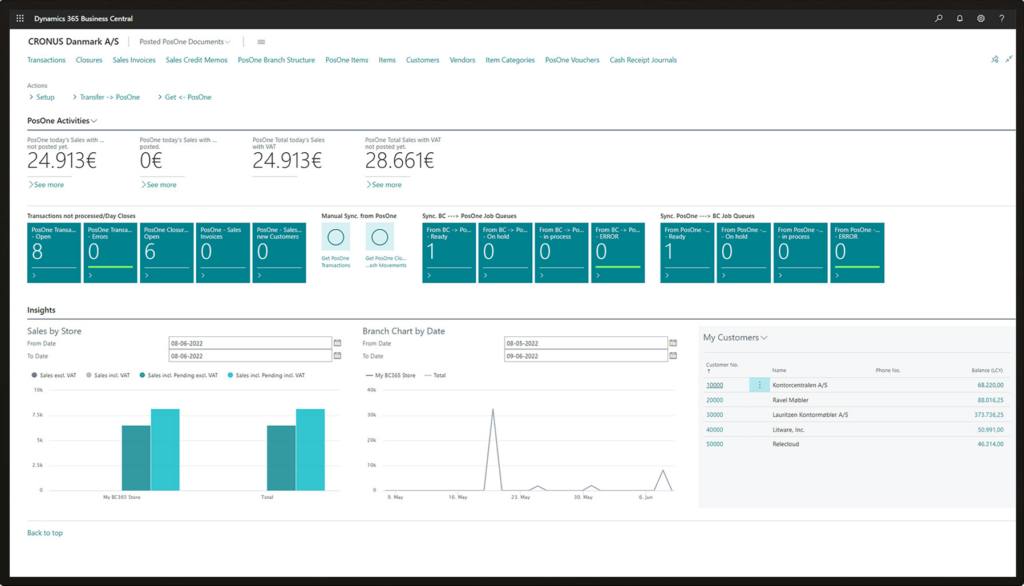
Screen 2. Overview of the most important sales data
The most important things this screen contains:
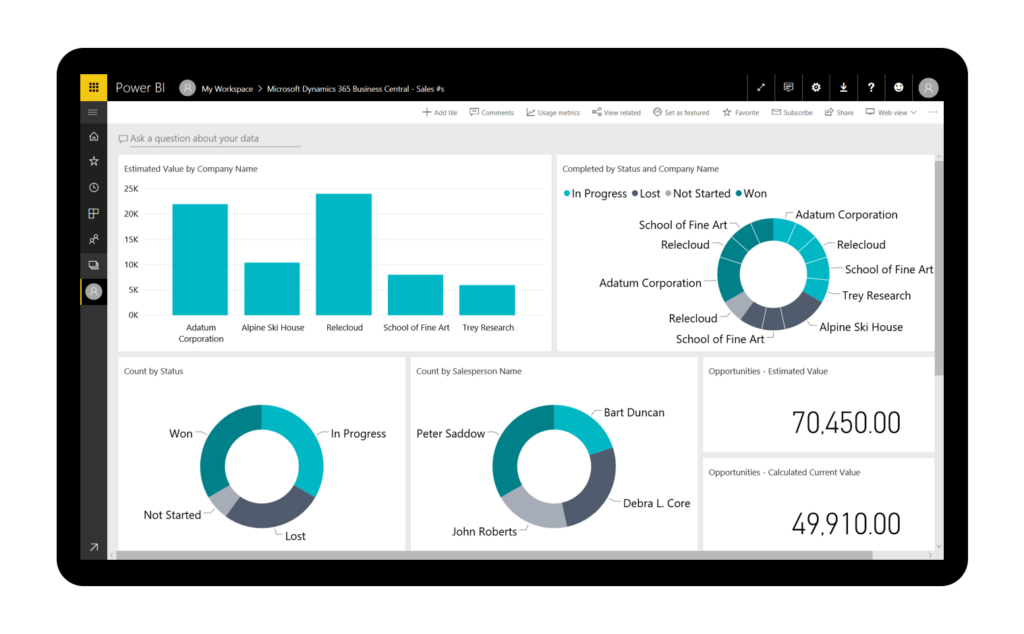
Screen 3. Specific product data
This part of the ERP contains individual product data. Below you see:
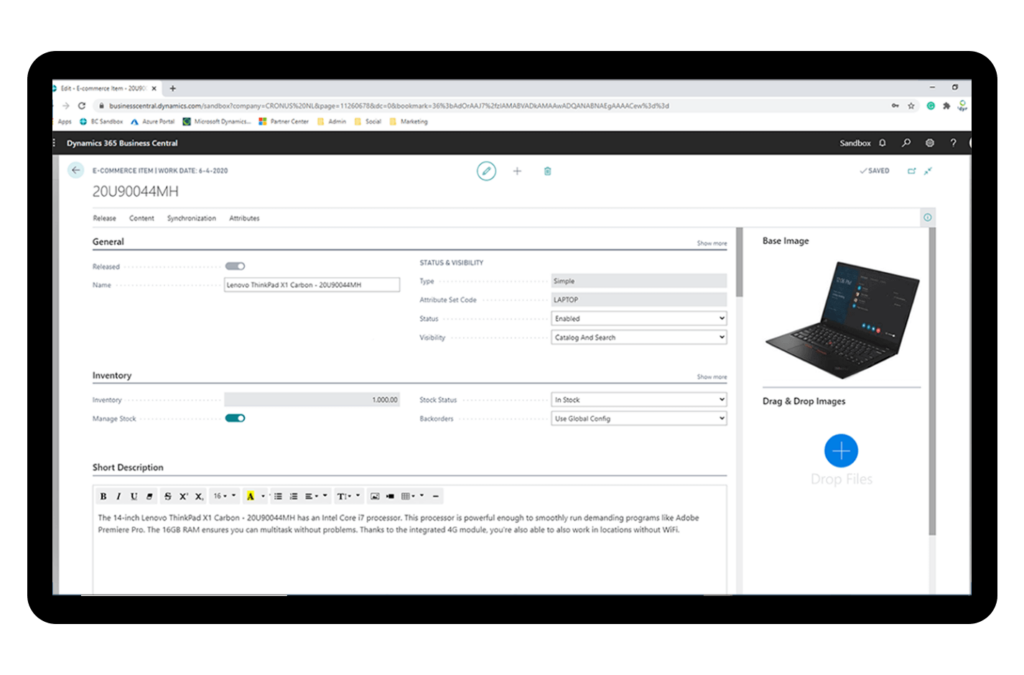
Hopefully you now have a better view on how ERP systems look like in reality!
These are the best-known ERP systems within the Dutch market:
These market shares are based on a 2019 Computable.nl survey. Due to several large acquisitions, ict.portal reports that Oracle's market share has probably moved toward 17% in the Dutch market.
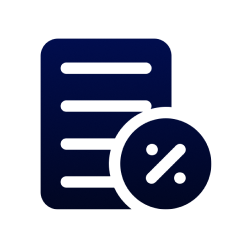
As you could read, you have many options within the ERP market. For example, you roughly have the choice between ERP packages that focus on specific industries or ERP systems that are flexible and customizable.
ActoBusiness, Cloudfashion and Torza are examples of ERP systems with one specific focus market. For example, these systems specifically target companies in the installation industry or the fashion industry.
So do you want a system made specifically for your niche market? Then it's best to go for this category. Do you want more flexibility? Then the category below, with its flexible and customizable ERP packages, might be a better option for you.

Uniconta, Microsoft Dynamics 365 and Oracle, on the other hand, are not specifically focused on a particular industry or company size. This makes these ERP packages flexible. This flexibility allows you to build on the basic functionalities as you wish.
However, these ERP systems do require more work, time and money to set up completely as desired.
We understand that it is quite a hassle to pick the right ERP system for your company. For this reason, we developed a tool for you that makes your choice much easier.
Complete our comparison tool in around 5 minutes and receive the following:
Fill out the selection tool and find out which ERP system suits your company:
Find your perfect ERP-systemAfter completing the selection tool, your results will be displayed in an overview. To get an idea of what you can expect, check out the test sample below.
